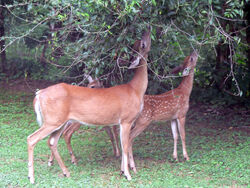
A deer and two fawns feeding on some foliage
A herbivore is often defined as any organism that eats only plants[1]. By that definition, many fungi, some bacteria, many animals, about 1% of flowering plants and some protists can be considered herbivores. Many people restrict the term herbivore to animals. Fungi, bacteria and protists that feed on living plants are usually termed plant pathogens. Microbes that feed on dead plants are saprotrophs. Flowering plants that obtain nutrition from other living plants are usually termed parasitic plants.
In zoology, a herbivore is an animal that is adapted to eat primarily plant matter (rather than meat). Although such animals are sometimes referred to as being vegetarian, this term is more properly reserved for humans who choose not to eat meat as opposed to animals that are unable to make such choices.
Herbivores can be further classified into various sub-groups, such as frugivores, which eat mainly fruit; folivores, which specialize in eating leaves; nectarivores, which feed on nectar; among herbivorous insects and other arthropods, the level of feeding specialization can be far more fine-tuned, including seed-eaters ("granivores"), pollen-eaters ("palynivores"), plant fluid-feeders ("mucivores"), and those specialized to feed on wood ("xylophages") or roots ("rhizophages"). In other animals, the degree of specialization is not so advanced, however, and many fruit- and leaf-eating animals also eat other parts of plants, notably roots and seeds. The diets of some herbivorous animals vary with the seasons, especially in the temperate zones, where different plant foods are most available at different times of year.
There is a misperception that if an animal is herbivorous, it represents less danger to humans than a carnivore (or, sometimes, no danger at all). This is not logically sound; few animals, even carnivores, will seek humans as a food source, but any animal will attack a human if necessary to defend itself. For example, in national parks such as the United States' Yellowstone Park, bison represent significantly more danger to humans than wolves, which are likely to avoid people. Of Africa's Big Five game (a term coined by hunters in Africa to refer to the five most dangerous animals to hunt: Rhinoceros, Leopard, Cape Buffalo, Elephant and Lion), three are herbivores.
Herbivores form an important link in the food chain as they transform the sun's energy stored in the plants to food that can be consumable by carnivores and omnivores up the food chain. As such, they are termed the primary consumers in the food chain.
See also
- Vegetarianism
- Veganism
- Omnivore
- Carnivore
- List of vores
- Plant defense against herbivory
- Herbivore adaptations to plant defense
- Seed predation
External links and references
- the herbivore defenses of Senecio viscusus
- Herbivore defense in Lindera benzoin
- Burton, N. H. K. (2002). Red Grouse chick eaten by sheep. Brit. Birds 95: 87.
- Furness, R. W. (1988). The predation of tern chicks by sheep. Bird Study 35: 199-202.
Amensalism • Commensalism • Mutualism • Neutralism • Synnecrosis • Predation (Carnivory, Herbivory, Parasitism, Parasitoidism, Cheating) • Symbiosis • Competition